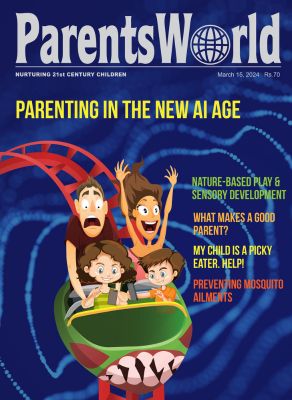– Mahek Uttamchandani, paediatric occupational therapist, Stepping Stones, Mumbai
Early diagnosis and a comprehensive and holistic intervention by a trained professional can help children suffering sensory processing disorders optimise and realise their innate learning potential.
Children who experience learning difficulties in school are often diagnosed with ‘sensory processing disorders’. Sensory processing enables the nervous system to receive messages from the senses and to respond with appropriate motor and behavioural impulses. Children who are unable to process information adequately lack eye-hand and motor coordination, experience poor body equilibrium and balance, and tire easily. It is estimated that six out of ten children who go in for occupational therapy functional assessment suffer poor sensory processing. Sensory integration is a neurological process wherein the brain receives information from the senses and then produces an appropriate response. It is by virtue of this process that we make sense of whats happening around us.
All classroom activities such as reading, writing, listening, comprehension, analysis, memory and retention, mathematical computation, art and craft skills, following instructions, as well as sports performance require adequate sensory processing. Academic success is also largely dependent on the physical skills of learning such as visual, auditory, perceptual and motor abilities. These physical skills of learning are by-products of good sensory processing and functioning.
Early diagnosis followed by comprehensive and holistic intervention by a trained professional can help children suffering poor sensory processing optimise and realise their innate learning potential. Combining techniques from sensory integration, educational kinesiology and brain gym, therapeutic listening programmes and remedial education sessions, can help children with learning difficulties. Optimal sensory functioning, body mind syncing and integration facilitate learning.
Here are the most common symptoms of sensory processing disorders which parents must watch out for:
Toddlers and Preschoolers
Poor sensory processing ability is likely to show up as con- fused or ‘mixed dominance i.e. poor right-left awareness and increased physical activity levels. Such children may appear to be clumsy or disorganised, with poor body balance and postural control, frequently bumping into objects or stumbling.
You will also notice that the child keeps trying to place objects in her mouth and experiences difficulty with pre- writing skills, motor control and following instructions.
In a preschool classroom, teachers should report poor emotional regulation, excessive crying, and difficulty in imitating actions and playing imitation games to parents.
Primary Years
Gaps in sensory processing are more pronounced in these years. Bad posture and slouching are common symptoms. The child may also zone out or “switch off” indicating attention and focus issues.
In terms of writing skills, there will be poor speed and legibility. In the classroom, the child may have difficulty copying from the board, completing assignments, and/or be reluctant to participate in class activities as well as on the games field. Difficulty tying shoe laces and buttoning, eating with cutlery, following complex multiple-step commands and poor self-worth are other tell-tale signs.
Middle Years and High School
In middle and high school, children suffering poor sensory processing are likely to be bullied in the class/playground because of differences in abilities and skills. They are likely to get frustrated when asked to complete tasks and their personal and work environments are disorganised. Emotions run rife as they seem to have a fixed and routine way of doing things and dont like sudden changes. They also have difficulty meeting deadlines and working in structured environments.
It is important for teachers and parents to be observant and report any sensory processing problems to experts who can help children and their parents cope and maximise the childs learning abilities.
The article was published in the print version of ParentsWorld February 2018 issue.




























